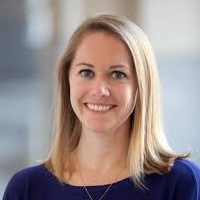
Lauren Risi
Project Director, Environmental Change and Security Program
Stimson Center
United States
Jun 14, 2021
Lauren Herzer Risi directs the Wilson Center’s Environmental Change and Security Program(ECSP), which fosters a community of researchers and practitioners pursuing the connections between the environment, security, and development. She first joined the Wilson Center in 2008, working with the Comparative Urban Studies Project, and has worked in ECSP for over ten of those years. Before joining the center, she served as a Peace Corps Response volunteer on relief and recovery after Hurricane Katrina, which sparked her interest in working with communities on environmental peacebuilding and disaster resilience. This interest led her to pursue her M.A. in Environmental Security and Peace from the University for Peace in Costa Rica. Lauren also holds a B.A. in history from the University of California, Los Angeles (UCLA).
As the director of ECSP, Lauren works to bridge frontline communities with decision makers and researchers. She is currently working on a new project on the linkages between climate change, violence, and migration in Central America. “There tend to be a lot of misconceptions and hyperbole around this topic, resulting in decision making driven by fear. We want action to be driven by research and on the ground realities rather than fear,” says Lauren. The project aims to identify climate interventions that are both conflict sensitive and strengthen civil society and governance. By putting climate security and migration researchers and practitioners in contact with frontline communities, the team at ECSP is working to find entry points for investment and programming that have maximize benefits across multiple sectors.
Through fostering dialogue between researchers and practitioners, Lauren works to amplify community and research voices in U.S. and international policymaking. She has found ECSP’s award-winning multi-media platform New Security Beat to be a productive channel for highlighting stories from the ground and distilling research for a policy audience. When I asked Lauren how she measures the impact of publishing these voices, Lauren replied, “Policy makers rarely come and tell you ‘we made this decision because of your publication,’ so it can be difficult to track. But readership numbers and anecdotal stories of impact certainly can help.” Over the past 18 months, the blog’s unique readers have increased from 25,000 to 50,000 per month, which Lauren attributes to rapidly growing interest in environmental security and peacebuilding. If statistics illumine the breadth of the blog’s reach, anecdotal evidence points to its depth. Impacted readers have reached out to ECSP to describe conversations started and connections formed as a result of an article.
Building communities of practice and supporting diverse voices are commitments Lauren also brings to the Board of Directors of the Environmental Peacebuilding Association. She believes that the Association is doing important work to professionalize the field and points to three priorities within this goal. First, she wants to build a community of practice to enrich discussions within the field and provide pathways to leadership for young professionals. A second part of professionalization is bringing the existence and importance of environmental peacebuilding to the attention of those outside the community of practice. And finally, she seeks to amplify diverse voices in the emerging field and notes than online events during the pandemic have helped increase diverse representation in events and meetings. Lauren’s work on building communities at ECSP and the Association highlights the crucial role that actively creating opportunities for new social and intellectual exchange plays in the theory and practice of environmental peacebuilding.
